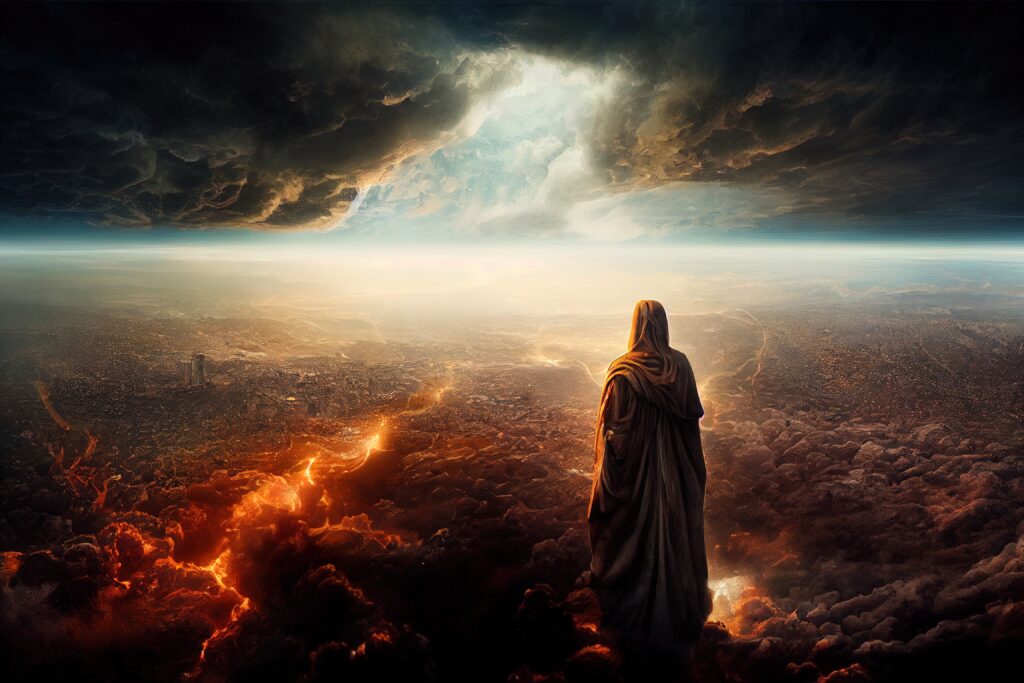
Four Living Creatures.
“In front of the throne was a shiny sea of glass, sparkling like crystal. In the center and around the throne were four living beings, each covered with eyes, front and back. The first of these living beings was like a lion; the second was like an ox; the third had a human face; and the fourth was like an eagle in flight. Each of these living beings had six wings, and their wings were covered all over with eyes, inside and out. Day after day and night after night they keep on saying, “Holy, holy, holy is the Lord God, the Almighty— the one who always was, who is, and who is still to come.” – Revelation 4:6-8. NLT
In this passage, we run into a group of four “living things,” the first of many strange and unusual creatures in the Book of Revelation. These four living creatures are full of eyes and have six wings each. Each of them reminds one of a completely different creature. It is like one of the most popular cartoon movies of all time, known as The Lion King. It appears to be an animal story, but it’s not actually about animals. It is based on Shakespeare’s Hamlet. The animals in the story represent people and how they relate to each other. The Lion King is, in fact, an African apocalypse. The cartoon portrays a perfect world, where everything is in balance and harmony. That world is then destroyed by the forces of evil and eventually restored by the heroic actions of a son. Revelation is a lot like that.
Writers of books and cartoons have often used animals to illustrate how people and groups of people behave. We find it easier to recognize ourselves and our behaviours if the insight comes through a story about animals. If a writer tries to make sensitive points more directly, we tend to resist or reject them because we feel under attack.
That’s what makes the Book of Revelation so powerful. Although it reads like an animal story, it’s not really about animals. It is more like a cartoon drama about the interactions among groups of people, both good and evil.
It is about the relationship between God and humanity, and how the course of human history is going to turn out. This is like how Jesus used parables to talk directly to people and situations. It sometimes took a bit of working out.
Why then do people find the Book of Revelation so tough to understand? It’s because the drama of Revelation was not created in the 1990s, lot the 21st century, it was written in the 90s to a group of seven churches in the Roman Province of Asia. When it was written, God was speaking their language and encouraging them in their situation. But in His message to them, God was creating an animated drama that would continue to inspire His people for nearly 2000 years.
The three-fold phrase “holy, holy, holy” echoes the sixth chapter of Isaiah. In Isaiah’s day, Judah faced a serious crisis. King Uzziah, who had reigned for 52 very successful years, had just died. So, for the people, there seemed nowhere to go but down! With fear, they faced an uncertain future.
At this time of crisis, The Priest Isaiah, while in the temple, has a vision of God’s throne. He sees angelic creatures around the throne singing, “Holy, holy, holy is the Lord Almighty” (Isa 6:3, NIV). Isaiah was a priest in the holiest place (the temple) among the holiest people on earth during one of most faithful periods of their history. Nevertheless, he recoils at this vision of the purity of God. He cries out, “Woe to me! I am ruined! For I am a man of unclean lips, and I live among a people of unclean lips, and my eyes have seen the King, the LORD Almighty” (Isa 6:5, NIV).
In the presence of God any sense of his own accomplishments, any sense of personal glory pales in the presence of absolute purity. Isaiah recognizes his own uncleanness, not because he has compared himself with anyone else, but because He has come face to face with God!
This is a powerful spiritual principle. It is easy to be proud of one’s spiritual growth and achievements when one compares them with the real and perceived foibles of others. The more you can put down the achievements of others, the higher you can stand in your own observation. But this means that your eyes are no longer on God. You have built yourself up at the expense of a genuine relationship with God!
One of the clearest signs that a person has lost touch with God, therefore, is a critical and fault-finding spirit. They confess the sins of others instead of their own sins. So ask yourself, whose sins do you confess – yours or others? By way of contrast, the clearest sign that a person has a living relationship with God is that he or she has a clear sense of personal depravity. Those who have looked in the face of God are painfully aware of their weaknesses, sins, and shortcomings. The good news is that an authentic awareness of sin and guilt is the prerequisite for acceptance with God. When we have truly hit bottom there is nowhere to go but up! Greatness comes on or knees or with bowed head.
